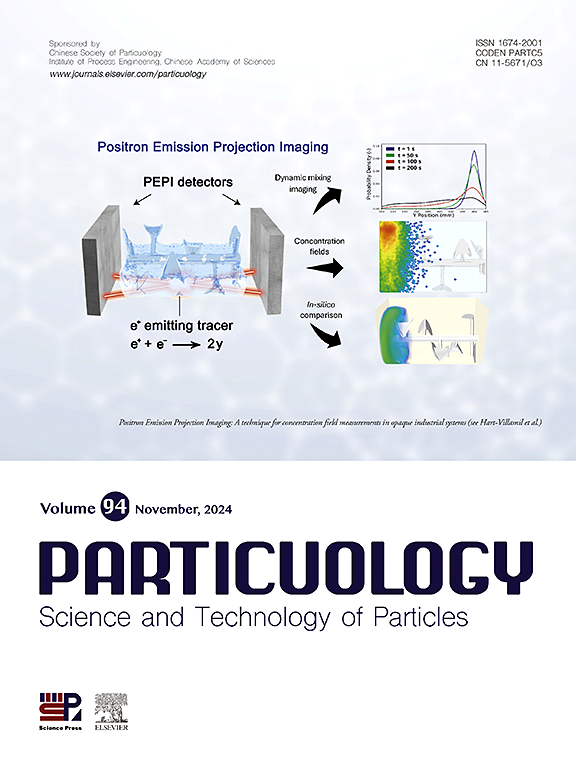Nucleation and growth of MOF-based composite materials for electrochemical energy storage
IF 4.1
2区 材料科学
Q2 ENGINEERING, CHEMICAL
引用次数: 0
Abstract
Existing studies have systematically summarized the synthesis methods, performance optimization strategies, and uses of MOF composites in areas such as supercapacitors, batteries, and electrocatalysis. Unlike existing literature, this review delves into the synthesis processes of MOF composites from the perspective of nucleation mechanisms, with an emphasis on the effects of induced nucleation (including dynamic and in situ nucleation) and seed-mediated growth (utilizing MOFs or functional materials as seeds) on material structures and properties. Induced nucleation influences crystal growth by modulating parameters such as temperature and solvents, while in situ nucleation controls the process through the introduction of specific precursors. Seed-mediated growth, on the other hand, involves the growth of crystals on pre-existing seeds supported on substrates. By leveraging the significant advantages of MOF composites, such as enhanced conductivity, stability, and performance, these materials have been shown to improve the functionality of supercapacitors and batteries. Additionally, they exhibit excellent catalytic activity in electrocatalysis. In summary, this study not only elucidates the nucleation mechanism-guided preparation methods of MOF-based materials but also uncovers their underlying mechanisms in electrochemical energy storage. It offers fresh perspectives and practical guidance toward the advancement of high-performance electrochemical power storage materials.
电化学储能用mof基复合材料的成核与生长
现有研究系统总结了MOF复合材料的合成方法、性能优化策略以及在超级电容器、电池、电催化等领域的应用。与现有文献不同,本文从成核机制的角度深入探讨了MOF复合材料的合成过程,重点研究了诱导成核(包括动态成核和原位成核)和种子介导生长(利用MOF或功能材料作为种子)对材料结构和性能的影响。诱导成核通过调节温度和溶剂等参数来影响晶体生长,而原位成核通过引入特定的前体来控制这一过程。另一方面,种子介导的生长涉及在基质上支持的预先存在的种子上生长晶体。通过利用MOF复合材料的显著优势,例如增强的导电性、稳定性和性能,这些材料已被证明可以改善超级电容器和电池的功能。此外,它们在电催化中表现出优异的催化活性。综上所述,本研究不仅阐明了以成核机理为指导的mof基材料的制备方法,而且揭示了其在电化学储能中的潜在机制。这为高性能电化学储能材料的发展提供了新的视角和实践指导。
本文章由计算机程序翻译,如有差异,请以英文原文为准。
求助全文
约1分钟内获得全文
求助全文
来源期刊

Particuology
工程技术-材料科学:综合
CiteScore
6.70
自引率
2.90%
发文量
1730
审稿时长
32 days
期刊介绍:
The word ‘particuology’ was coined to parallel the discipline for the science and technology of particles.
Particuology is an interdisciplinary journal that publishes frontier research articles and critical reviews on the discovery, formulation and engineering of particulate materials, processes and systems. It especially welcomes contributions utilising advanced theoretical, modelling and measurement methods to enable the discovery and creation of new particulate materials, and the manufacturing of functional particulate-based products, such as sensors.
Papers are handled by Thematic Editors who oversee contributions from specific subject fields. These fields are classified into: Particle Synthesis and Modification; Particle Characterization and Measurement; Granular Systems and Bulk Solids Technology; Fluidization and Particle-Fluid Systems; Aerosols; and Applications of Particle Technology.
Key topics concerning the creation and processing of particulates include:
-Modelling and simulation of particle formation, collective behaviour of particles and systems for particle production over a broad spectrum of length scales
-Mining of experimental data for particle synthesis and surface properties to facilitate the creation of new materials and processes
-Particle design and preparation including controlled response and sensing functionalities in formation, delivery systems and biological systems, etc.
-Experimental and computational methods for visualization and analysis of particulate system.
These topics are broadly relevant to the production of materials, pharmaceuticals and food, and to the conversion of energy resources to fuels and protection of the environment.
 求助内容:
求助内容: 应助结果提醒方式:
应助结果提醒方式:


